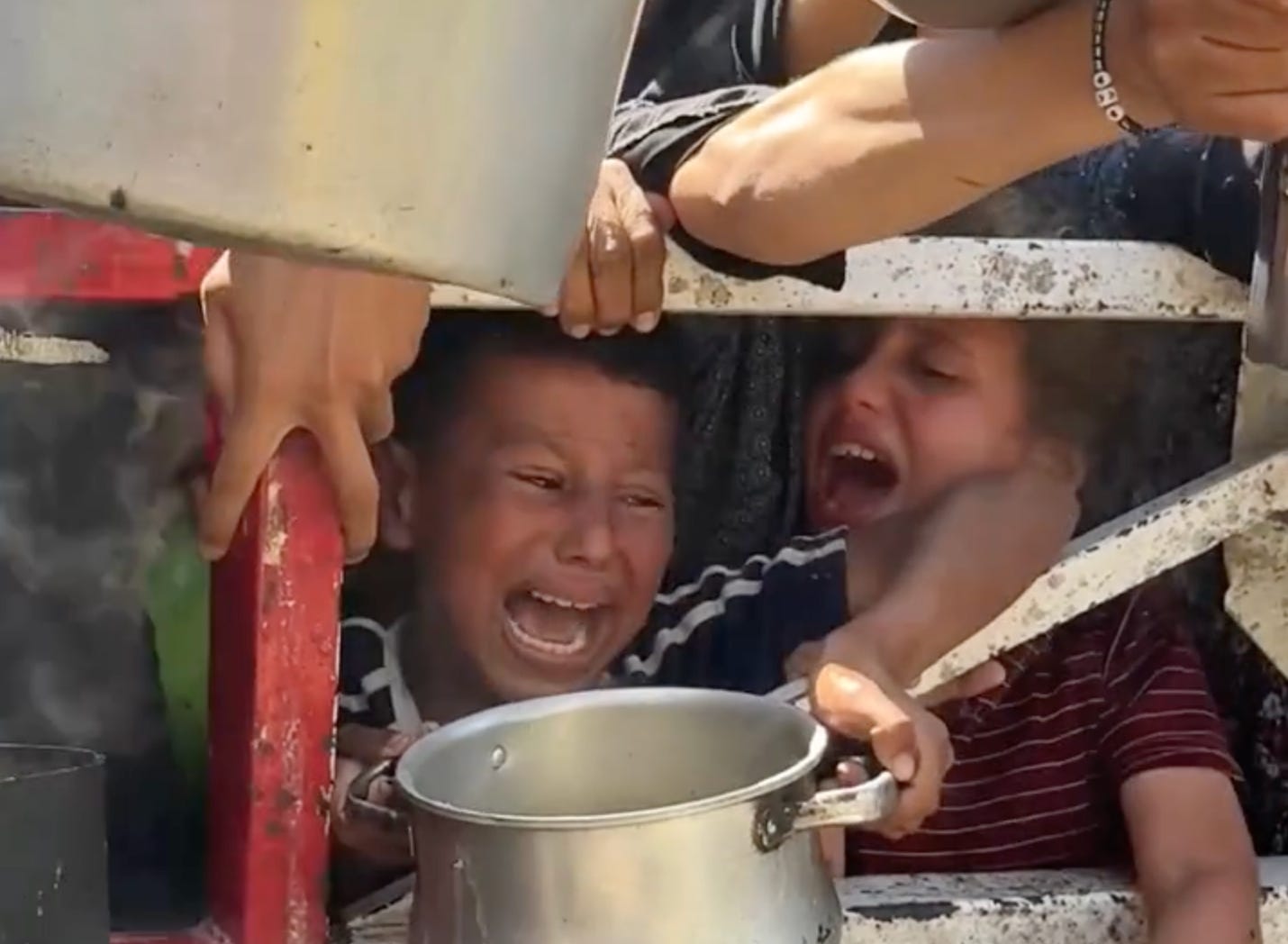The people of Gaza are starving. The people of Gaza are being starved because of a failed humanitarian system implemented by a vengeful government, run by people who do not seem to care if the people of Gaza starve — or are displaced or shot or bombed. To quote Haaretz, Israel is starving Gaza.
As is so often the case in war, women and children who didn’t start it and did nothing to perpetuate it see unique horrors. According to UNFPA, the birthrate in Gaza has declined by more than 40% since before the war: Many women are too malnourished to get pregnant or to carry pregnancies to term. A third of the babies born in Gaza were born underweight, premature, or with other problems requiring putting them in the NICU. And what NICU? Gaza’s infrastructure has been destroyed, and even basic supplies for infants — things like baby formula — cannot get through the Israeli blockade. The rate of maternal death is 20 times what it was in 2022.
I can’t find an Israeli statement on these particular stats; I would guess that, as is the case with most statistics coming out of Gaza, Israel disputes them. But I haven’t seen Israel offer its own numbers. Israel has blocked journalists from entering Gaza, so reports are impossible to independently corroborate. Israel has blocked many humanitarian groups from bringing the volume of aid needed.
Writing about Israel and Palestine is exhausting because it requires so much throat-clearing, and it’s a master class in whataboutism. What about what this group did first? What about this other concern? What about this other line of culpability? There are no shortage of bad guys here, no danger in running out of people onto whom to cast blame, no dearth of moments when all of this could have been different. But here, in this reality, Gazans are starving right now. Children are starving. Mothers cannot feed their babies. None of this is a natural disaster. This was both predictable and predicted.
At the core of my politics is the idea that we can care about many things all at once — that acknowledging the suffering of one group does not have to take away from the suffering of another. Proportion matters, of course. But empathy needn’t be finite. The suffering of Israelis on Oct. 7 was immense. The traumas that follow generations of Jewish experience are real. The grief for the hostages remains raw. The evil of Hamas, a group that is now trying to leverage the world’s outrage at mass starvation to enable their own ends even if it means more Palestinians will starve, is hard to overstate. The reality of rising anti-Semitism is terrifying, and makes a Jewish state feel all the more necessary. The fear that rises up when opposition to this war and to the Israeli government gets tied up in opposition to a Jewish state is acute — when the war is discussed in terms of whether or not Israel should exist, a reflexive and in my view pointless and dangerous frame not applied to places like, say, Sudan or South Sudan or Rwanda or the DRC or Russia or Pakistan or any of the Islamic countries that denies equal rights regardless of religion. We can hold all of that.
And also, and I would argue, we can say with the utmost urgency: Mothers in Gaza are cradling babies whose spines are visible through their skin. Desperate, hungry people are being shot by IDF forces at food distribution centers. Far-right Israeli leaders and some average Israelis are saying without fear that they want to take Gaza as part of Israel, that they want an ethnic cleansing, that forget debates over whether this is a genocide — they want a genocide.
Israel controls the food that comes in and out of Gaza. The Israeli government has been using food as leverage, arguing that Hamas steals food supplies, sells them, and then profits, using those resources to continue waging this war. Hamas has proven that they believe vast Palestinian suffering benefits their cause. But Israel also has a choice about how much suffering to impose. You don’t starve a civilian population because horrible actors might steal and sell the food.
Gaza is starving. It is starving because of choices made by the Israeli government. There is no explaining that away.
Israel chose to put into place a new aid system run by private US contractors who dole food out at a tiny number of sites overseen by IDF soldiers. They gutted the previous systems of humanitarian relief and aid delivery. They struggled to find any competent, experienced person to lead this aid scheme, because it was so facially dangerous and foolish. It has turned into a calamity. And despite worldwide outrage, Israel is doing little to fix the situation, because, as far as I can tell, Israel’s current leadership isn’t particularly moved by the reality of Palestinian starvation, suffering, and death. Neither is America’s current leadership, which seems keen to enable the worst parts of the Netanyahu government.
These evil policies are a threat to Palestinian life. But they’re also a threat to Israel. It may not be rational or fair that Israel’s existence is up for debate, but Israel is a small albeit extremely powerful country with some very hostile neighbors, relying on a United States with shrinking global influence and a Europe with shrinking sympathies. Even before the war, Israel’s right-wing government was, like America’s, turning the country away from democracy (and got much farther than the Trump administration has here). The more Israel behaves as a violent, authoritarian power engaging in shocking war crimes, slaughtering civilians, and forcibly displacing an entire population, the harder it gets for anyone decent — including many liberal Jews — to stand in its defense. Israel’s biggest threat to its own existence as even a marginal democracy is itself — or at least, this current iteration of itself. (I would also argue that the emergence on “anti-Zionism” and the end of Israel as a Jewish state as a core requirement of leftist and pro-Palestinian politics is just as much an own goal, insofar as it creates a feedback loop of existential threat that makes conflict easy and compromise nearly impossible, but that’s another post).
Israel, like America, is not just a country but an idea and a set of ideals. And like America, the core of that idea is contested. What is at stake right now, at least for supporters of Israel, is not the nation’s physical existence — Hamas, I am pleased to inform you, does not have the ability to wipe Israel off the map — but its soul.
You can’t starve a civilian population and keep your soul.
As an American, I don’t believe that a vile government impugns the legitimacy of a country, or confirms some inherent badness of a whole people; if that was the case, I’d be in some trouble. But I do think this is a moment that demands clarity and action, not justification or equivocating. Gazans are starving. Babies are wasting away. This is a choice. We can make a different one. And there will be dire consequences to continuing down this path, including for the many people who are turning Gaza into Hell.
xx Jill





















